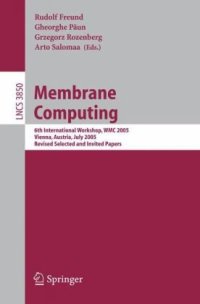
Ebook: Membrane Computing: 6th International Workshop, WMC 2005, Vienna, Austria, July 18-21, 2005, Revised Selected and Invited Papers
- Genre: Computers // Organization and Data Processing
- Tags: Computation by Abstract Devices, Mathematical Logic and Formal Languages, Simulation and Modeling, Bioinformatics
- Series: Lecture Notes in Computer Science 3850 : Theoretical Computer Science and General Issues
- Year: 2006
- Publisher: Springer-Verlag Berlin Heidelberg
- Edition: 1
- Language: English
- pdf
This book constitutes the thoroughly refereed extended postproceedings of the 6th International Workshop on Membrane Computing, WMC 2005, held in Vienna, Austria, in July 2005.
The 20 revised full papers presented together with 5 invited papers went through two rounds of reviewing and improvement. The papers in this volume cover all the main directions of research in membrane computing, ranging from theoretical topics in mathematics and computer science, to application issues, especially in biology. More specifically, these papers present research on topics such as: computational power and complexity classes, new types of P systems, relationships to Petri nets, quantum computing, and brane calculi, determinism vs. nondeterminism, hierarchies, the size of small families, algebraic approaches, and designing polynomial solutions to NP-complete problems through the use of membrane systems.
This book constitutes the thoroughly refereed extended postproceedings of the 6th International Workshop on Membrane Computing, WMC 2005, held in Vienna, Austria, in July 2005.
The 20 revised full papers presented together with 5 invited papers went through two rounds of reviewing and improvement. The papers in this volume cover all the main directions of research in membrane computing, ranging from theoretical topics in mathematics and computer science, to application issues, especially in biology. More specifically, these papers present research on topics such as: computational power and complexity classes, new types of P systems, relationships to Petri nets, quantum computing, and brane calculi, determinism vs. nondeterminism, hierarchies, the size of small families, algebraic approaches, and designing polynomial solutions to NP-complete problems through the use of membrane systems.